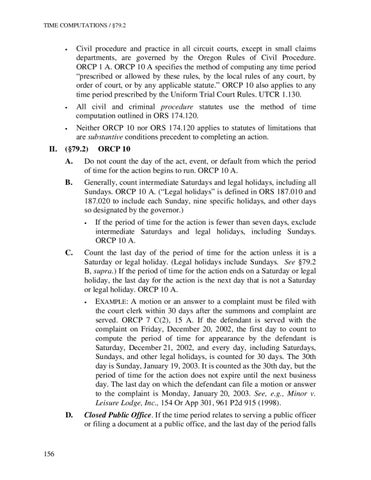TIME COMPUTATIONS / §79.2
II.
•
Civil procedure and practice in all circuit courts, except in small claims departments, are governed by the Oregon Rules of Civil Procedure. ORCP 1 A. ORCP 10 A specifies the method of computing any time period “prescribed or allowed by these rules, by the local rules of any court, by order of court, or by any applicable statute.” ORCP 10 also applies to any time period prescribed by the Uniform Trial Court Rules. UTCR 1.130.
•
All civil and criminal procedure statutes use the method of time computation outlined in ORS 174.120.
•
Neither ORCP 10 nor ORS 174.120 applies to statutes of limitations that are substantive conditions precedent to completing an action.
(§79.2) A.
Do not count the day of the act, event, or default from which the period of time for the action begins to run. ORCP 10 A.
B.
Generally, count intermediate Saturdays and legal holidays, including all Sundays. ORCP 10 A. (“Legal holidays” is defined in ORS 187.010 and 187.020 to include each Sunday, nine specific holidays, and other days so designated by the governor.) •
C.
D.
If the period of time for the action is fewer than seven days, exclude intermediate Saturdays and legal holidays, including Sundays. ORCP 10 A.
Count the last day of the period of time for the action unless it is a Saturday or legal holiday. (Legal holidays include Sundays. See §79.2 B, supra.) If the period of time for the action ends on a Saturday or legal holiday, the last day for the action is the next day that is not a Saturday or legal holiday. ORCP 10 A. •
156
ORCP 10
EXAMPLE: A motion or an answer to a complaint must be filed with the court clerk within 30 days after the summons and complaint are served. ORCP 7 C(2), 15 A. If the defendant is served with the complaint on Friday, December 20, 2002, the first day to count to compute the period of time for appearance by the defendant is Saturday, December 21, 2002, and every day, including Saturdays, Sundays, and other legal holidays, is counted for 30 days. The 30th day is Sunday, January 19, 2003. It is counted as the 30th day, but the period of time for the action does not expire until the next business day. The last day on which the defendant can file a motion or answer to the complaint is Monday, January 20, 2003. See, e.g., Minor v. Leisure Lodge, Inc., 154 Or App 301, 961 P2d 915 (1998).
Closed Public Office. If the time period relates to serving a public officer or filing a document at a public office, and the last day of the period falls
